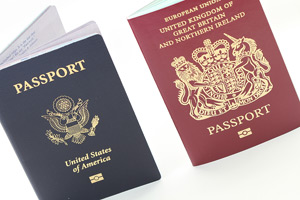Dual Citizenship
Dual Citizenship often arises as a matter of law. Usually, it requires little or no action on the part of the person seeking dual citizenship. However, the fact is that the United States does not favor dual citizenship (Rogers v. Bellei, 401 U.S. 815 (1971)). Still, it is not prohibited by U.S. law. U.S. law does not require a dual national to elect one nationality over another. The law of the other country decides whether the U.S. oath of allegiance effectively expatriates the person from his native citizenship.
 Most countries consider dual citizenship or multiple citizenship undesirable. Since a country has control only over who has its citizenship and not over who has any other country's citizenship, they limit dual citizenship by denying their own citizenship to people in cases where they apply for another country's citizenship.
Most countries consider dual citizenship or multiple citizenship undesirable. Since a country has control only over who has its citizenship and not over who has any other country's citizenship, they limit dual citizenship by denying their own citizenship to people in cases where they apply for another country's citizenship.
Partial Citizenship: Many counties allow foreigners or former citizens to live and work indefinitely there. However, for voting, being voted and working for the public sector or the national security in a country, citizenship of the country concerned is always required. The Overseas Citizen of India is an example of partial citizenship.
Please read and follow the citizenship law of your country of origin to decide the issue of your eligibility for dual citizenship.
India and the Overseas Citizenship of India
The Constitution of India usually does not permit holding Indian citizenship and citizenship of a foreign country simultaneously.
The Government of India has now enacted laws to grant Overseas Citizenship of India (OCI), commonly known as “Dual Citizenship”. Persons of Indian Origin of certain category who migrated from India and acquired citizenship of a foreign country, other than Pakistan and Bangladesh, are eligible for grant of OCI as long as their home country does not object to it under their respective laws.
The Indian Parliament passed a Bill on December 22, 2003 to grant overseas citizenship to people of Indian origin. The Bill received the President's assent on January 7, 2004. Dual Citizenship is not open to all people of Indian origin. It is only open to those from some specific countries that are on the approved list. It will only be granted on a case-by-case basis due to security concerns.
The countries covered for grant of Overseas Citizenship are the United States, Canada, United Kingdom , Australia, Cyprus, Finland, France, Greece, Ireland, Israel, Italy, Netherlands, New Zealand, Portugal, Sweden, and Switzerland.
The persons registered as OCI will neither have any voting rights nor be eligible for elections to Lok Sabha, Rajya Sabha, Legislative Assembly/Council or constitutional posts as President, Vice President, or Judge of Supreme Court or High Courts, etc.
Benefits of OCI
- Lifelong visa to visit India ;
- Such persons can stay in India for any length of time without reporting to police authorities; and
- Parity with NRIs in financial, economic and educational fields. However, no special benefits for acquisition of agricultural or plantation properties.
For more details, please visit Embassy of India, Washington, D.C's website. You may also access the following links for useful information on OCI.
- Application forms for Overseas Citizenship
- FAQ's on Overseas Citizenship
- Online Registration
- Online Status Enquiry



